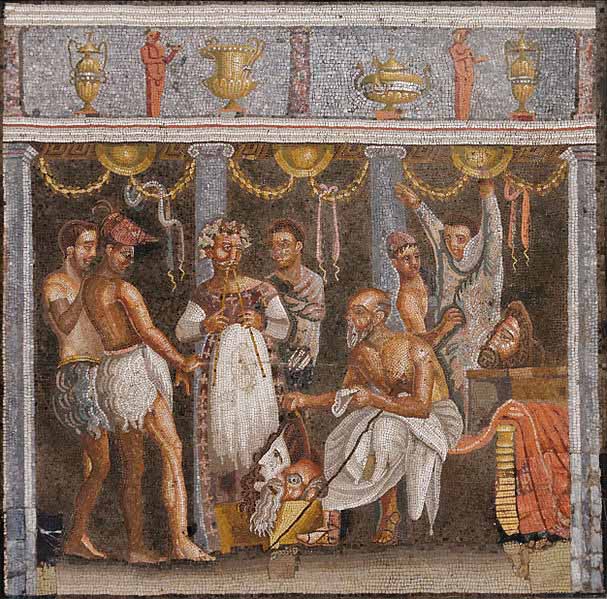

The theatre of ancient Rome was a thriving and diverse art form, ranging from festival performances of street theatre, nude dancing, and acrobatics, to the staging of Plautus's broadly appealing situation comedies, to the high-style, verbally elaborate tragedies of Seneca. Although Rome had a native tradition of performance, the Hellenization of Roman culture in the 3rd century BC had a profound and energizing effect on Roman theatre and encouraged the development of Latin literature of the highest quality for the stage.
The Roman historian Livy wrote that the Romans first experienced theatre in the 4th century BC, with a performance by Etruscan actors. Beacham argues that they had been familiar with "pre-theatrical practices" for some time before that recorded contact. Roman drama began in 240 BC with the plays of Livius Andronicus. It remained popular throughout Late Antiquity, by the mid 4th century, 102 out of 176 ludi publici being dedicated to theatre, besides a considerably lower number of gladiator and chariot racing events.
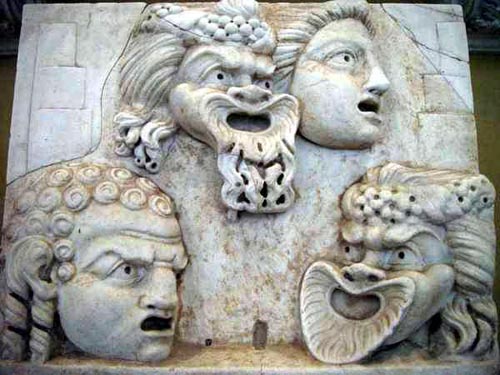
Following the expansion of the Roman Republic (509-27 BC) into several Greek territories between 270–240 BC, Rome encountered Greek drama. From the later years of the republic and by means of the Roman Empire (27 BC-476 AD), theatre spread west across Europe, around the Mediterranean and reached England; Roman theatre was more varied, extensive and sophisticated than that of any culture before it. While Greek drama continued to be performed throughout the Roman period, the year 240 BC marks the beginning of regular Roman drama. From the beginning of the empire, however, interest in full-length drama declined in favor of a broader variety of theatrical entertainments.
The first important works of Roman literature were the tragedies and comedies that Livius Andronicus wrote from 240 BC. Five years later, Gnaeus Naevius also began to write drama. No plays from either writer have survived. While both dramatists composed in both genres, Andronicus was most appreciated for his tragedies and Naevius for his comedies; their successors tended to specialise in one or the other, which led to a separation of the subsequent development of each type of drama. By the beginning of the 2nd century BC, drama was firmly established in Rome and a guild of writers (collegium poetarum) had been formed.
The Roman comedies that have survived are all fabula palliata (comedies based on Greek subjects) and come from two dramatists: Titus Maccius Plautus (Plautus) and Publius Terentius Afer (Terence). In re-working the Greek originals, the Roman comic dramatists abolished the role of the chorus in dividing the drama into episodes and introduced musical accompaniment to its dialogue (between one-third of the dialogue in the comedies of Plautus and two-thirds in those of Terence).
The action of all scenes is set in the exterior location of a street and its complications often follow from eavesdropping. Plautus, the more popular of the two, wrote between 205 and 184 BC and twenty of his comedies survive, of which his farces are best known; he was admired for the wit of his dialogue and his use of a variety of poetic meters. All of the six comedies that Terence wrote between 166 and 160 BC have survived; the complexity of his plots, in which he often combined several Greek originals, was sometimes denounced, but his double-plots enabled a sophisticated presentation of contrasting human behavior.
No early Roman tragedy survives, though it was highly regarded in its day; historians know of three early tragedians - Quintus Ennius, Marcus Pacuvius and Lucius Accius. From the time of the empire, the work of two tragedians survives—one is an unknown author, while the other is the Stoic philosopher Seneca. Nine of Seneca's tragedies survive, all of which are fabula crepidata (tragedies adapted from Greek originals); his Phaedra, for example, was based on Euripides' Hippolytus. Historians do not know who wrote the only extant example of the fabula praetexta (tragedies based on Roman subjects), Octavia, but in former times it was mistakenly attributed to Seneca due to his appearance as a character in the tragedy.
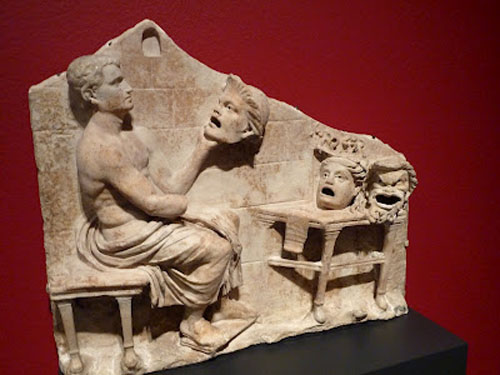
The adulescens was the hero, who is young, rich, love-struck and none too brave. He tends to bemoan his fate and requires backup. Another character often has to take action on his behalf. His father is often the senex or old man, whom he fears, but does not respect. He wears a dark wig and his clothes are usually crimson.
The senex has several incarnations. As the father he is either too strict or too soft; either one he does out of love for his son. As the lover he embarrasses his son, his slave, and his wife. He tends to be passionately in love with the same woman as his son, who is much too young for the senex. He never gets the girl and is often dragged off by his irate wife. Sometimes he is a friend of the family who helps the adulescens. He is often a miser, who wears a straight undergarment with long doubled sleeves. It is white and he sometimes carries a staff.
The leno runs the brothel. The love interest of the adulescens may be owned by the leno and work at his brothel so the adulescens is often forced to deal with him. He is unabashedly amoral and is only interested in money. He dresses in a tunic and mantel and is often bald with a moneybag.
The miles gloriosus, literally braggart soldier, is a character that is especially familiar today. He loves himself more than anything else and sees himself as handsome and brave, while in reality he is very stupid, cowardly, and gullible. He may be interested in the same girl as the adulescens. He wears a tunic with long sleeves and has curly hair.
The parasitus or parasite lives only for himself. He is often seen begging meals or being refused them. He lies for his own gain. He dresses in a long, black or gray garment with long, doubled sleeves.
The servi (slaves) take up about half of the cast and often have the most monologues. They are not the toilers typical of a real Roman home. The servus callidus or clever slave is always talkative, but his other traits vary. Most of the time he is loyal, more so to the adulescens than the senex. He brings tricks and comedy and tends to drive the plot. He is often the one who finds the truth out at the end of the play. He could be identified by his tendency to use alliteration and meter in his speech. The servi wear tunics and hold or carry scarves.
The ancilla is a maid or nurse of no particular age. She is a minor character used to move the plot by presenting information or helping to develop another character. She is a tool of her mistress and may be used as a messenger. The matrona (mother), mulier (woman), or uxor (wife) is shrewd. She loves her children, but is temperamental towards her husband. She does not have to be a devoted wife, but sometimes is. She wears a long garment with flowing sleeves and a mantel.
The meretrix (prostitute) is either a mercenary or devoted. The first type is older or more experienced and has seen a lot. The second type is truly in love with the adulescens. Both are very attractive with a complex hairdo and outfit, which is yellow. She also has a mantel.
The virgo (young maiden) is the love interest of the adulescens, but does not get much stage time. She is beautiful and virtuous with little personality. She is treated as a prize.
Livius Andronicus, a Greek slave taken to Rome in 240 BCE, who wrote plays based on Greek theatre. Rome's first playwright.
Plautus, 3rd century BC comedic playwright and writer of Miles Gloriosus, Pseudolus, and Menaechmi.
Terence, who wrote between 170 and 160 BC.
Gaius Maecenas Melissus, 1st century playwright of a "comedy of manners"
Seneca, 1st century dramatist most famous for Roman adaptations of ancient Greek plays like Medea and Phaedra.
Ennius, contemporary of Plautus who wrote both comedies and tragedies
Pacuvius, Ennius's nephew and tragic playwright
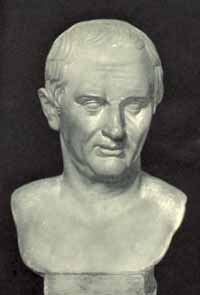
Poets in Ancient Rome

Literature in Ancient Rome
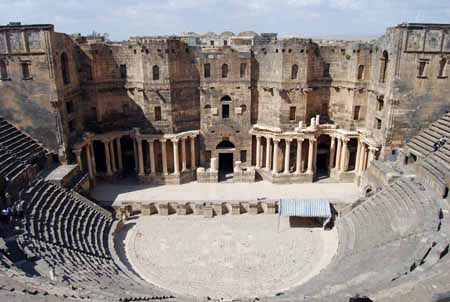
Ancient Rome Theaters
ANCIENT AND LOST CIVILIZATIONS